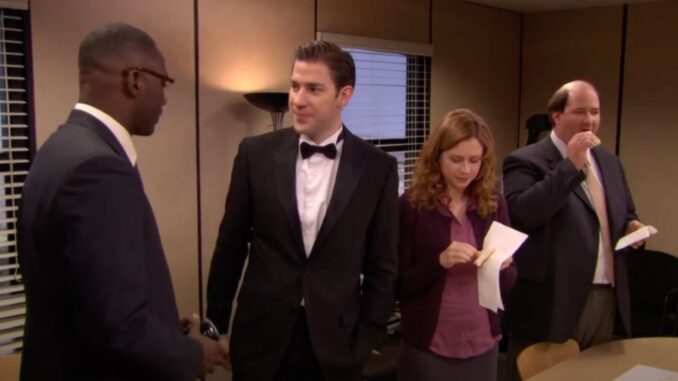
Dwight Takes Office Fashion to the Next Level: A Cautionary Tale in Khaki and Mustard
Dwight K. Schrute, Assistant Regional Manager (Assistant to the Regional Manager) of Dunder Mifflin Scranton, has never been known for his subtlety. His dedication to beet farming, volunteer sheriffing, and unwavering fealty to Michael Scott borders on the fanatical. This devotion bleeds into every aspect of his life, including, and perhaps most alarmingly, his fashion choices. While most of his colleagues strive for business casual, Dwight aims for "business… consequential," pushing the boundaries of office attire to levels that are both perplexing and, frankly, terrifying.
Dwight’s standard uniform is a testament to functionality over flair: a mustard yellow, short-sleeved shirt perpetually straining against his biceps, a muted brown tie held in place by a tie clip, and, of course, the ever-present khaki pants. This ensemble, seemingly ripped from a 1950s farmer’s almanac, speaks volumes about Dwight's values. It whispers of practicality, tradition, and a profound misunderstanding of contemporary fashion trends. While he believes he’s projecting an image of authority and rugged competence, the reality is a spectacle of beige mediocrity.
However, Dwight’s commitment to pushing the envelope isn’t limited to his everyday attire. It's when he attempts to elevate his look, to take his office fashion to the "next level," that things truly go awry. Take, for instance, the infamous "Survival Suit" incident. In anticipation of an unspecified, yet imminent, disaster, Dwight adorned himself in a full camouflage jumpsuit, complete with multiple pockets filled with survival essentials like beef jerky, a first-aid kit that looked suspiciously expired, and a compass of questionable accuracy. While his intentions might have been noble (protecting his colleagues from unseen threats), the execution was, to put it mildly, disruptive. The clanging of survival gear and the sheer bulk of the outfit rendered him an obstacle course, hindering workflow and provoking bewildered stares from clients.
Then there’s the episode where Dwight attempted to incorporate "Schrute Farms" into his professional wardrobe. In a misguided attempt to promote his bed and breakfast, he arrived at the office sporting a beet-stained apron, a straw hat precariously perched atop his head, and mud-caked boots. The smell of freshly tilled soil permeated the office, much to the chagrin of Angela, who deemed it "unhygienic" and "an affront to the delicate ecosystem of my desk." While Dwight argued that he was simply embracing his heritage and diversifying his personal brand, his colleagues saw it as a blatant disregard for office protocol and a personal hygiene concern.
Even Dwight's attempts at sophisticated attire often backfire. His ill-fated decision to wear a suit two sizes too small to impress a potential client resulted in a series of unfortunate incidents: buttons popping off, seams splitting, and an overall impression of being trapped in a sartorial straightjacket. The ensuing awkwardness and physical discomfort completely derailed the meeting, proving that a well-fitted, even if plain, suit is far superior to a flashy, ill-proportioned one.
Dwight’s fashion faux pas are not simply a matter of poor taste; they are a manifestation of his character. He sees fashion as a tool, a means to an end. He believes that by dressing a certain way, he can project power, competence, and unwavering dedication. However, his lack of self-awareness and his inability to understand social cues often lead him down a path of comedic and sartorial disaster.
Ultimately, Dwight’s attempts to take office fashion to the "next level" serve as a cautionary tale. They demonstrate that true style is not about outlandish outfits or adherence to outdated trends, but rather about understanding context, respecting boundaries, and possessing a healthy dose of self-awareness. And perhaps, most importantly, knowing when to leave the beet-stained apron at the farm. While his efforts may be misguided, and often downright ridiculous, Dwight's unwavering commitment to his own unique vision of office fashion serves as a constant source of amusement and a reminder that, in the world of Dunder Mifflin, anything is possible, even a mustard-clad revolution. The only question is, will it succeed, or simply result in another memo from HR? Only time, and Dwight’s next sartorial misadventure, will tell.